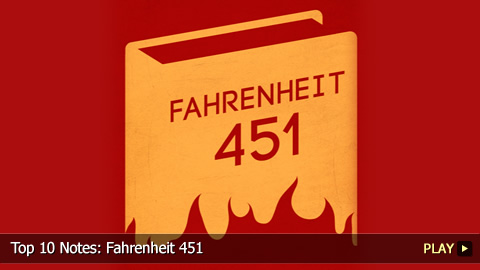Top 10 Notes: Fahrenheit 451

#10: About the Author
Born in 1920 in Illinois, Ray Bradbury began writing original material when he was 11. After his family moved to L.A., he began writing poetry in high school. Bradbury then expanded to short stories, acting, playwriting, novel writing and non-fiction essays. He continued to write after suffering a stroke in 1999, but illness later took his life in 2012.
#9: Influences and Inspirations
“Fahrenheit 451” combines ideas taken from several of Bradbury’s previous short stories. This includes censorship through book burning and a society completely under state control. As such, it contains both science fiction and dystopian elements. “Fahrenheit 451” was used for the title as it’s the temperature at which paper spontaneously catches fire and burns.
#8: Settings and Era
The novel is set in the future, sometime after the 1990s, in an unnamed, probably American, city. Bradbury was inspired to create “Fahrenheit 451”’s violent world when American Republican Senator Joseph McCarthy and his supporters began condemning political rebels with little or no proof. His knowledge of political organizations that burned books and the rise of television also influenced his writing.
#7: Plot
Though the novel is narrated by an unknown third person, it’s through Guy Montag’s thoughts and actions that we learn what happens. As a fireman, Montag’s job is to burn the homes of the people who’ve read government-banned books. But a fateful meeting with a new neighbor makes him question his life and he steals a book from an old woman targeted by the government. He then convinces his wife Mildred to read the books he’s stashed and enlists the help of an English professor named Faber. But after he reads poetry to Mildred’s friends, Montag is reported to the authorities and ordered to burn down his house. He obeys but kills fire Chief Beatty while trying to protect Faber. Montag escapes and joins other banished book-readers in the country. Along with their leader Granger, the group witnesses the city’s nuclear destruction and returns to help with its reconstruction.
#6: Guy Montag
As the protagonist, Guy Montag is initially gullible and a slave to the system. But he soon begins to question his fireman role, which is marked by the phoenix symbol, and whether he should be blindly obeying the powers that be. Though these ideas make him a traitor in the eyes of society he continues his pursuit of knowledge. He even tries to persuade his wife to join him and gets an English professor to help. He’s confused and unhappy but gains wisdom through books and his experiences and is reborn like the phoenix.
#5: Mildred “Millie” Montag and Captain Beatty
As Montag’s pale, thin and indifferent wife, Millie gets through life by watching TV and taking sleeping pills. The cold and unemotional woman is unable to have any deep conversations with her husband and ultimately gives him up to the authorities. As Chief fireman, Beatty is Montag’s boss. He’s a former reader who explains the conflicting nature of books makes them worthless. He uses these treacherous weapons that he calls books to manipulate Montag, but is eventually killed by him after he attempts to go after Faber.
#4: Faber and Granger
Faber is an ex-English professor who wishes he’d done more to prevent government censorship of books. Initially reluctant to help Montag, he starts to offer his guidance through a homemade earpiece. He’s a complex character who tries to manipulate Montag using books. Montag encounters the intelligent, patient and confident Granger after escaping to the countryside. As the leader of the banished readers, Granger helps his group preserve the contents of books so that they can be passed on.
#3: Values and Themes
One of the novel’s main themes is the importance of knowledge, whether it’s through books, other sources or experience. It also explores the role of government in society, how technology and conformity affect people, the search for identity, and happiness versus dissatisfaction.
#2: Modern Popularity
Despite early mixed reviews and censorship attempts, “Fahrenheit 451” is considered an extremely creative and important work. Thanks to its themes, Bradbury’s award-winning tale is also one of his most popular.
#1: Adaptations
While it’s been adapted for radio and the stage, “Fahrenheit 451”’s most notable adaptation is the 1966 sci-fi drama that overcame mixed reviews and won praise from Bradbury himself.
Do you agree with our list? What’s your favorite piece of “Fahrenheit 451” trivia? With new videos published daily, be sure to subscribe to WatchMojo.com for more informative top 10s.
